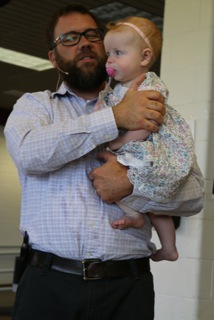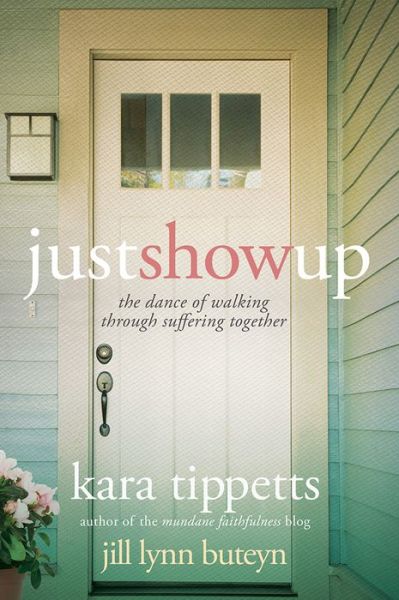This week was a tough week. A friend whom I met through the Mundane Faithfulness Community on Facebook had a very scary surgery on Monday. As in a not-sure-she-will-pull-through kind of surgery. I won’t keep you in suspense: this dear friend not only survived her scary surgery, she is exceeding all our expectations as she recovers. But there were touch-and-go moments, and I was glued to my phone in case I got news. It was a rollercoaster of a week, not just for me, but for the entire MFC. I journeyed that fear and worry and gracemongering with some of the best.
And it got me thinking—this living in community is not all roses and sunshine. If I weren’t a part of this community, my husband wouldn’t have come home from work to me crying. I wouldn’t have woken up a million times in the night Monday to pray. We talk so much about community here at Mundane Faithfulness, but I’ve decided there are a few reasons to avoid it:
1. It’s insistent.
A couple of days before Christmas, I was on my way home from picking up my brother from the airport when I received a text from Jill: Look on your porch. Sure enough, when I got home, there were gifts for my entire family just outside the front door. Not the kind of gifts that expect something in return or are given out of obligation—the kind of gifts given from a place of love and desire to bless and delight. Later that night, Heather texted saying she and her family were out looking at Christmas lights and they were stopping by with [well needed] coffee for me, my brother, and Aaron. And then on Christmas Eve after I had come down with bronchitis, my sister-friend Caroline texted me from Chicago wanting to send her mother over with a meal so I wouldn’t have to cook. Here we were trying to have a nice, isolated Christmas with my brother holed up in our bungalow, and people kept showing up to love us even when I didn’t ask them to!
I’ve learned that when you live in community, you are loved and cared for despite yourself. People make the decision to love you, and then they do it! Even if you say, No, thanks, I’m okay—I’d rather hide out in my little home alone, they will still show up at your door with a casserole when they discover you are sick or they will invite themselves over to hear your heart or they will ask you to pray for them because they need your love, too. No matter what you say to discourage your people from pursuing you and barging into your hiding place, when people love you, they will climb mountains to be with you.
2. It’s humbling.
For years Aaron and I prayed for good, solid community. What we didn’t realize is that when you have good community and are loved well, your pride gets very injured. It turns out that in order to even have good community, you have to be vulnerable because you have to be vulnerable to be known. It turns out that people who want to know you want to know your story, which is humbling because their love is nothing you earned. Love is purely a gift bestowed on us by the giver.
It turns out that people are messy, and trying to live in relationship with them is messy.
When you live in close community, you will hurt people’s feelings, even when you don’t intend to. You’ll end up having to ask for forgiveness and apologize for hurting someone you love. And you’ll have to forgive others, too, forsaking bitterness and resentment.
It turns out that you can’t do community on your own. You have to ask for God’s help to love others well. Your pride in how well you can love and take care of others will be exposed and you’ll find yourself on your knees time and time again.
It turns out that accepting gifts is humbling. That being a gracious receiver is cringe-inducing and requires acknowledging that you don’t have everything and you don’t have it all together and maybe, yes, you would benefit from a casserole or help in your yard creating a vegetable garden or prayer on a dark day.
3. It’s costly.
I’ve learned that being in community doesn’t require me to prepare gourmet meals for my friends when they’re over, but after a while, we discovered that we spend quite a bit on toilet paper and tissue. And hot tea. We have a permanent tea station set up so that our community can indulge in the most delicious of teas when they are in our home. I wonder how much money we’ve spent over the years on tea?
I wonder how much time others have sacrificed to love me when I was unlovable—to be available and to drop everything when I was hurting. I wonder how much time has been spent on us as friend after friend commits to praying for me and my family. I wonder what the ladies who love on my community’s babies during our little Bible study could be doing if they weren’t sacrificing their Wednesday mornings. I wonder what fun, hip things Rob and Cosette would do with their evenings if they weren’t babysitting my babies and giving Aaron and me a chance to go out on dates.
If you avoid community, you don’t have to deal with running out of toilet paper because you’ve welcomed so many people into your home. You don’t have to remember who is allergic to what foods because you won’t be making meals for anyone. Your pastor won’t text you to check up on you when you’ve missed church. You won’t have to worry about catching colds from cuddling and kissing your friends’ snotty babies. You won’t lose sleep from thinking/praying/worrying about a hurting friend. And no one else will lose sleep from thinking/praying/worrying about you.
4. It hurts.
When Aaron came home to me crying on Monday evening, I was crying because I was afraid that I would have to say goodbye to my friend. I was crying because I love her and I didn’t want to have to mourn her. If I didn’t love her, I wouldn’t be so sad. If I didn’t love Kara and do life with her, then I wouldn’t be nearly as sad when Jesus called her Home. When my friends are gathered and one is pouring out her heart, crying over her hard situation, I can’t help but cry. I ache for her brokenness. I hurt for her; I beg God to bring healing and redemption to her marriage. I carry that weight around with me so that I can pray for her and check in on her and help her bear it in her weakness. It hurts.
When you live in community with others, you are bonded together. So when one person hurts, everyone hurts. When one mama’s child is rejected at school, I feel like a knife goes through my heart; I ache for the child and the mama. I feel the injustice and am angry and protective.
If I didn’t live in community, it wouldn’t hurt when my friend announced that her family is moving out of town. It wouldn’t make me cry to get a text from someone who has seen me—noticed the state of my heart amidst the busyness of life—and who is offering prayer and acceptance and safety. It wouldn’t make my heart ache to see others embracing my children and loving them as their own.
I think C.S.Lewis sums it up well:
“To love at all is to be vulnerable. Love anything and your heart will be wrung and possibly broken. If you want to make sure of keeping it intact you must give it to no one, not even an animal. Wrap it carefully round with hobbies and little luxuries; avoid all entanglements. Lock it up safe in the casket or coffin of your selfishness. But in that casket, safe, dark, motionless, airless, it will change. It will not be broken; it will become unbreakable, impenetrable, irredeemable.”
In what ways do you struggle with community? What have you sacrificed for good community? What has been sacrificed for your benefit by others? What kinds of hurts have you experienced by walking with others in your community? Are these hurts worth it? What would you say to someone looking for good community? How can they be ready for the challenges that come with doing life with others?








